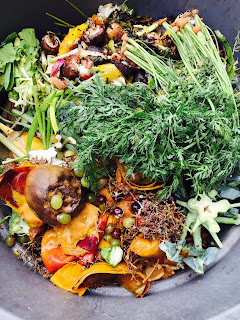On food, beverages, and basic products.
I woke up this morning and instinctively reached for a tissue. Not this time.
Within the first thirty minutes of my consciousness this morning, I started mapping out my day realizing that I needed a no-waste solution for, well, everything. Armed with my mason jar of homemade granola, food for most of the day picked up at the Tomkins Square Farmer's Market yesterday, and two handkerchiefs, I set forth to tackle the day, waste-free.
 |
| A slightly heavier commute this morning |
Today, I learned three things: (1) there's always a waste-free option if you're willing to get creative; (2) plan ahead; and (3) you have more support systems around you than you could imagine.
On Day 1, I want to cover the basics: zero waste drinking and zero waste food.
On beverages, the solution is remarkably simple and empowering: get a reusable cup. Ditch the plastic and paper cup. My reusable cup has already gotten a ton of mileage. Not only were my baristas more than happy to fill my own cup with coffee at Roasting Plant, but they also incentived me with an $0.20 BYOM (bring your own mug) discount. It might not seem like much, but $0.20 for each working day means an annual savings of $50 over the whole year. That's $16 extra coffees. That's also the price of a TI-89 calculator on Craigslist (cue inside jokes on my love affair with scientific calculators).
Better yet, making your own coffee and tea is cheaper and compostable. At work, I brought my trusted $0.99 tea strainer and some recently acquired loose leaf tea to keep me going through the morning. Tea leaves, coffee grinds, and even paper coffee filters can be added to most compost piles covered below.
You see, here in America as the world's most coffee-addicted nation, we consume 400 million coffee cups per day according to Harvard's School of Public Health's National Coffee Drinking Trends study (yep, that study exists). And yet, per the EPA, the average American office worker still uses about 500 disposable cups each year that go straight to the landfill. Aside from coffee, we rip through 2.5 million plastic bottles every hour and only about a quarter are actually recycled.
All of this doom and gloom can be solved with one reusable cup.
Throw a mug or cup from home in your bag, bring it to work, and you'll make a rewarding first step towards being a zero-waste hero.
Enter GrowNYC, a great organization in the city that provides free services and tools across all five boroughs to improve the city and the environment. A quick Google search showed me that on Mondays, Wednesday, Fridays, and Saturdays, GrowNYC accepts food scraps at Union Square, along with 38 other locations across the city. GrowNYC compost is transformed into fertile soil amendments used in local urban farms.
What constitutes compost? GrowNYC accepts fruit and vegetable scraps, non-greasy scraps like rice, bread, and pasta, coffee grounds and filters, tea bags, egg and nut shells, pits, and cut or dried flowers. So, eat up all your meat folks.
After dumping my compost at Union Square, I couldn't resist picking up some snacks for the afternoon at the Farmer's Market. I found these carrots, asked the seller if I could cut the roots off after purchasing them, disposed the roots in the compost, and carried 15 delightfully decapitated carrots into my reusable bag for some afternoon snacking.
"1/4 loaf please, hold the bag."
As they say, make landscapes, not landfill (common phrase, right?). Regardless, I can get behind that.
In summary:
- Invest in a reusable cup or mug; bring it to work
- Invest in a Nalgene and refuse all plastic bottles, especially water
- Put a small container on your desk or in your kitchen for food scraps
- Spend 60 seconds researching your nearest compost center
On tomorrow's docket: zero-waste hygiene, debunking the bidet, and the easiest way to live a waking hour waste free.
Later this week: no-waste/no-awkwardness socializing and the realm of possibilities for zero-waste household products.
Total daily waste: 1 toothpick (thanks tempting apple samples, you always win)





Great intentions = Great outcomes!
ReplyDeleteYou've given me so many good ideas to eliminate waste on an everyday basis.
So proud.... a great tribute to your organic gardener Grandpa
Great post! Everyone (me & J) is waiting for the bidet experiment. We are literally invested in it. :D!
ReplyDelete